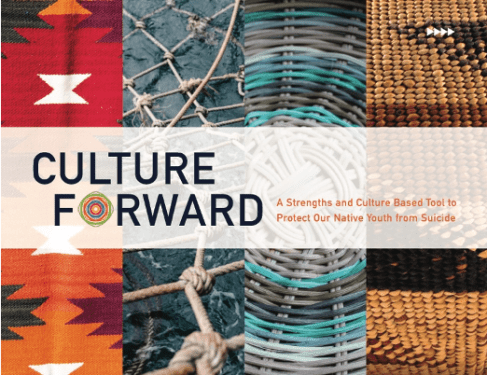
FOR IMMEDIATE RELEASE—CULTURE FORWARD: A Strengths and Culture Based Tool to Protect Native Youth from Suicide is a new 54-page report with tribally driven, evidence- and practice-based solutions to prevent Native youth suicide. This report was developed by the Johns Hopkins Center for American Indian Health in partnership with Casey Family Programs, an operating foundation committed to supporting tribes in strengthening tribal nations’ capacity to keep children healthy, safe, and connected with their families, communities and cultures. CULTURE FORWARD provides tribal leaders, youth, Elders, health and human service providers, and other change agents with evidence-based ideas and community-based solutions to leverage strengths within Native communities to protect youth against suicide.
CULTURE FORWARD was developed through a two-year iterative, collective effort with diverse Native communities. Authors spent six months conducting listening sessions with more than 60 Native stakeholders including tribal leaders, Native youth leaders, grassroots leaders working to prevent suicide in their communities, Elders, traditional healers, Native military service members and veterans, and Two-spirit leaders. From these listening sessions, five core themes emerged to form the guiding principles and chapters of CULTURE FORWARD: Our networks harness belonging and help keep us safe; Connections to our lands and Elders allow us to thrive; Traditional knowledge holds the keys to health and healing; Native youth lead us to reclaim our autonomy and well-being; and Self-determination empowers us to fight. Authors also convened a national advisory editorial board to review, edit, and ensure CULTURE FORWARD was shaped by Native perspectives. Members shared feedback and input that shaped the final CULTURE FORWARD guide. Authors also reviewed published reports of Indigenous-led innovations to prevent suicide.
“Prior to CULTURE FORWARD, the majority of published literature and resources about American Indian/Alaska Native youth suicide was problem- and deficit-based,” said Victoria O’Keefe, PhD, (Cherokee/Seminole Nations of Oklahoma) Mathuram Santosham Endowed Chair in Native American Health at Johns Hopkins University, Associate Director at the Johns Hopkins Center for American Indian Health, and lead author for the report. “These accounts missed essential understanding of Native communities’ capacity to promote unique cultural strengths and traditions to protect youth.”
Each listening session highlighted the importance of cultural strengths to help prevent suicide. CULTURE FORWARD flips the dominant narrative and elevates Indigenous knowledges, findings, and resources that represent strengths- and culture-based approaches to prevent suicide and promote healthy Native youth development.
The guide includes a foreword from Deb Haaland (Pueblo of Laguna), then U.S. Congresswoman of New Mexico’s 1st congressional district. “The CULTURE FORWARD guide is an opportunity to start a movement that uplifts our young people as valued and vital to our future,” she writes. “Indeed, their future path is an essential thread of a greater tapestry of well-being for all Native communities.”
Designed with implementation in mind, CULTURE FORWARD includes actionable steps that community leaders can take and links to resources containing additional knowledge from urban and tribal Native communities. The resource offers an important step toward building a national coalition to advance a cultural and strengths based Indigenous movement to promote Native youth well-being.
Download the report: bit.ly/CultureForward
Learn more about the collaborative effort: cih.jhu.edu/programs/cultureforward
Watch Deb Haaland discuss CULTURE FORWARD: https://www.youtube.com/watch?v=zZOQsGA9sVE
**Media Contact: Kathleen Hennessy | 617-861-7982 | khennes6@jhu.edu
About the Johns Hopkins Center for American Indian Health
Founded in 1991 and based in the Department of International Health of the Johns Hopkins Bloomberg School of Public Health, the Johns Hopkins Center for American Indian Health supports public health interventions designed for and by Native peoples. The Center has offices in tribal communities across Arizona and New Mexico as well as a Great Lakes Hub serving tribes in Minnesota, Wisconsin, and along the shared border with Canada. The Center also supports public health interventions in more than 140 tribal communities in 21 states. These partnerships have achieved landmark public health breakthroughs credited with saving millions of children’s lives in the U.S. and worldwide.